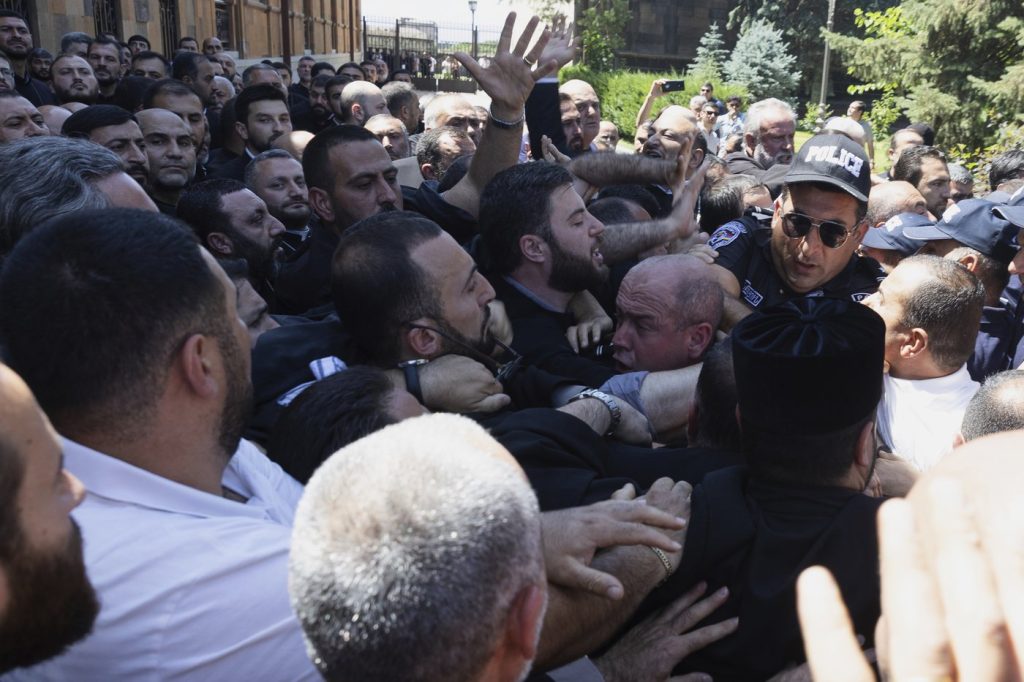YEREVAN, Armenia (AP) - Armenia has seen a significant escalation in governmental crackdowns against dissenting voices, particularly targeting prominent clerics. In a notable turn of events, a second high-profile cleric, Archbishop Mikael Ajapahyan, was arrested on charges of plotting against the government, following Archbishop Bagrat Galstanyan's arrest a day prior. The Yerevan court ordered Ajapahyan to be held in pre-trial detention for two months, a decision his lawyer, Ara Zohrabyan, described as “obviously illegal and unfounded,” indicating plans to appeal.
The National Security Service has accused Ajapahyan of publicly advocating for an armed coup against Prime Minister Nikol Pashinyan's government. This incident unfolded outside Yerevan at the headquarters of the Armenian Apostolic Church, where security forces attempted to apprehend the archbishop amid scuffles with clergymen and the ringing of cathedral bells, as reported through videos circulating on social media. In defiance, Ajapahyan stated, “I have never hidden and I am not going to hide now,” branding the situation as lawlessness and asserting that the real threat lies with the government.
Last year, there were widespread protests with tens of thousands rallying against Pashinyan after the government's decision to relinquish control over several border villages to Azerbaijan as part of efforts to normalize relations between the two nations, which have had a long history of territorial disputes since the early 1990s. This tension reignited with Azerbaijan's military campaign in September 2023, which resulted in the loss of the Karabakh region to Azerbaijan.
The arrest of Archbishop Bagrat Galstanyan, who leads the Sacred Struggle opposition movement, heightened concerns regarding the treatment of political dissenters in Armenia. He was accused of allegedly orchestrating a sabotage campaign to overthrow Pashinyan, a claim dismissed as “fiction” by his legal representation. Members of the Sacred Struggle movement have vehemently opposed the government's territorial concessions, asserting that the administration is infringing upon political rights.
The growing discontent towards Pashinyan has extended beyond territorial matters to a broader critique of his leadership since he assumed power in 2018. Recently, Russian-Armenian billionaire Samvel Karapetyan was also arrested for urging the government's overthrow, further emphasizing the chilling effect on free speech and dissent in the country.
The longstanding dispute between Armenia and Azerbaijan has roots in the collapse of the Soviet Union, leading to ethnically charged conflicts over territories. Following military confrontations in 2020 and again in 2023, Azerbaijan reclaimed territories that had remained under Armenian control for almost three decades, exacerbating tensions and population displacements.
Pashinyan has made efforts in recent months to smooth relations with Azerbaijan, including a visit to Turkey, Azerbaijan's ally, in a bid to mend historical rifts. The relationship between the Armenian government and the Armenian Apostolic Church, the principal religious authority in Armenia, has also deteriorated; earlier this year, Pashinyan called for church leader Karekin II to resign over allegations of breach of celibacy vows, which the church labeled as undermining Armenia's “spiritual unity.”
These developments signal a worrying trend in Armenia where government actions against dissenters may undermine democracy and social stability in a nation already grappling with deep historical grievances and regional tensions.











